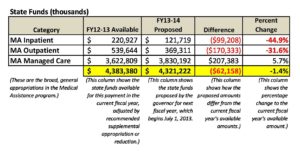Feds Offer New Carrot to Promote Medicaid Expansion
In their desire to persuade states to expand their Medicaid programs as called for in the Affordable Care Act, federal officials are now suggesting that states could use new federal Medicaid funds to enable Medicaid-eligible people to purchase private insurance.
Even though this was not envisioned in the health reform law, the prospect of making greater use of the private sector appears to be appealing to many Republican governors who have otherwise been reluctant to commit their states to expanding their Medicaid programs.
Pennsylvania has no current plans to expand Medicaid eligibility, although there appears to be growing interest in doing so throughout the state. Expansion would add approximately 500,000 people to the state’s Medicaid rolls, many of whom would be served by safety-net hospitals. The Safety-Net Association of Pennsylvania (SNAP) supports Medicaid expansion in the commonwealth.
Read more about how this idea came about, why many states find it appealing, how it would work, and what the potential challenges are in this New York Times article .
.




